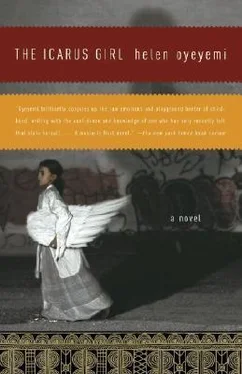“Why can’t you stop being angry, Jessamy?” Jess felt Sarah mumble into the shoulder of her nightie.
Jess replied, “Tilly, Tilly, Tilly, Tilly, Tilly.”
Upstairs, Jess’s father had been woken up by the commotion, and when Jess opened her eyes, she saw him step over the piece of banister that had fallen away and walk into the kitchen as if he hadn’t seen it.
“Just forget all about it. It’s over,” TillyTilly said, somewhat petulantly from Jess’s bedside. Jess, with the covers pulled up over her face, tried to breathe quietly, but her heart was fluttering, letting her know that it was not after all OK to be scared. She had given up on her safe place. There was no safe place after last Saturday night; nowhere was safe when downstairs Shivs had been forced to dance that clumsy dance in her pyjamas, lifting her feet high, so high, colliding with every surface until she went to hospital and was all white and still and not getting better. Everyone thought that she, Jessamy, had pushed Siobhan, and in a way she was glad to be blamed at last; it had been bound to happen, she couldn’t have three people got and just get away with it, no way. She knew why Shivs’s being got had been different from her father’s — TillyTilly had not liked Shivs from the start, and Shivs had said that she wasn’t scared of anything, but she should have been scared, trying to tell Jessamy that her own twin sister didn’t like her. That’s what TillyTilly was telling her now.
“You’re not really allowed to go and see Siobhan in hospital,” Jess’s mum had told her, even though Jess hadn’t asked. She knew that Dr. and Mrs. McKenzie wouldn’t let her; they didn’t think she was a bad girl, TillyTilly had told Jess during the fever-days following Shivs’s being got . They just thought that Jess was very troubled, and she needed to see a new doctor. But that wasn’t going to happen, because this time TillyTilly was going to look after her and make sure that she didn’t have to see a new doctor and get in trouble all over again. Jess had accepted that while she was sick, but now she was better.
“You’re a ghost,” Jess whispered to TillyTilly from under the covers.
TillyTilly began to get angry.
“I’m not,” she insisted. “I’m not a ghost! That’s a dumb thing to say!”
“You are,” Jess insisted, fainter now as she grew less certain.
“Jessy, I’m not a ghost! I am NOT a ghost.”
Jess turned over, teeth gritted.
“What happened to your twin then?” she asked.
She heard TillyTilly breathing quietly, but no reply. Jess recalled Shivs’s screaming and the stream of red-black.
“I don’t know,” TillyTilly said, her voice pressing soft into the dark.
“What?”
“I can’t remember. All gone. Only my name—”
Oh, God. Only Titiola’s name was left, and Jess had taken even that. It couldn’t be, it couldn’t be. How could you forget being ripped away from your twin?
“Ah, Jess, but you did,” TillyTilly said aloud. “It’s the ripping part that you forget first. It never comes back.”
“TillyTilly, but you are dead, aren’t you?” Jess pleaded, turning back towards the now indistinct form of her friend kneeling at the bedside. She timidly touched Tilly’s hand. “I don’t understand.”
“No. Now forget, forget,” TillyTilly said, pulling down the covers and touching Jess’s forehead with her soft, brown hand. She was the long-armed woman now, and she smelt of coconuts.
Jess had her eyes closed and didn’t open them, because then she fell deeply asleep and dreamt that she was flying, flying high above all the land, onward and onward, disappearing like a pin thrown into the blue. The rushing wind stung her eyes into slits, and her fluffy hair rippled out in sheets behind her, sometimes whipping in her eyes and lashing across her cheek. She would never fall, because her friend was flying with her and would catch her.
It was a blessing, even if she didn’t know it — the remembering of so many things that were her fault being drained away from her by her sister, who had promised to take care of her. Memories were burdens that took Jessamy through three worlds of hurt, the three worlds that only twins inhabit, and she was only half a twin.
Yet even as she fell asleep, Jess was aware on some level that her memories were being moulded so that they were all different, and that Siobhan had not been dancing, but rolling, bump bump bump, from upstairs to down, terrible, she shouldn’t have pushed her, why had she pushed her?
It was a hot day in June when Jess returned from the park through the back door into the kitchen, and noticed that there was an empty coffee cup in the sink.
It was her father’s.
Puzzled but happy, she smiled, feeling as if this was somehow a gift. She dropped her mother’s hand and ran through the kitchen and into the passageway, shouting, “Daddy?”
He was in bed, but that was OK. She wanted to tell Tilly, but she was nowhere to be found.
“Daddy, there were, like, ten people in that car!” Jess risked the gusty whirring of the air-conditioning on her face as she knelt up on the seat and gesticulated wildly at the battered light-blue Ford that had just pulled ahead of them on the road. The people were crammed inside the car so tight that from the back they looked like one dark mass, as if they had been mixed together and spread across the car windows. You could differentiate backs of heads and necks, but only eventually.
“Um, I think that’s another cab,” her father said doubtfully, fanning himself with a newspaper as he looked at her mother for verification.
“Yup! The police don’t really care about that sort of stuff round here,” Sarah told Jessamy, who was gaping as she tried to imagine being in the backseat with six or seven other people, all in a ball of sweat, elbows, knees and rough hair.
They were back in Lagos, two days before Jess’s ninth birthday.
“The buses are worse,” Sarah smiled, to loud guffaws from their cabdriver.
Daniel playfully dragged Jess back down into a sitting position on the seat and threw his arms around her. She briefly rested her head on his shoulder and twisted a few strands of his hair around her finger, delighting in his laughing “ouch,” glad that he was here and real, and that his eyes and hands and movements were his own again. Then they were both laughing as Sarah told them (and the driver) a new story that her friend Yemi, who lived at Ojoo, had told in a letter she had written her. The roads entering and leaving the immediate vicinity of Ojoo were extremely bumpy and filled with potholes, and Yemi had written that a truck loaded with petrol had crashed just outside the town. The driver had managed to escape the entanglement relatively uninjured and flee the scene for assistance, the immediate result of which had been about thirty people ignoring imminent danger and running out with buckets to fill up on diesel for their electricity generators. If you could afford a generator in the first place, you could never have enough fuel for it, since NEPA was always in the throes of some system failure that meant no light, and petrol was very expensive. It was an irony, said the driver, nodding sagely, that in a country where the chief source of wealth was petrol, people were behaving as if they’d never seen it before. Sarah bitterly suggested government corruption and Daniel tentatively agreed, but with a pull in his voice as if he suspected that he might be laughed at for offering his opinion. The driver, sent from Bodija by Sarah’s father, who had airily ignored her insistence that she could get a cab herself, laughed at both of them.
Читать дальше












